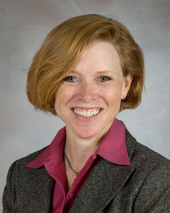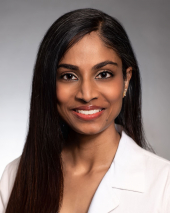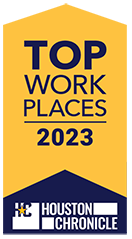The beginning of Katherine O’Brien’s breast cancer journey started the same as many others, with a lump.
“In my heart, I knew it was cancer,” she shared. “Since it was Super Bowl Sunday and I couldn’t call my doctor, I called my friend who is an OB-GYN for reassurance.”
First thing Monday morning, she made an appointment with her own OB-GYN for the following day. Although their visit was brief, her suspicions of cancer grew the moment her physician requested further testing.
In a whirlwind of a day, O’Brien managed to receive a mammogram, an ultrasound, and a breast biopsy thanks to multiple canceled appointments by other patients. All that was left to do was wait for the results that would determine if she would become a cancer patient at the young age of 34.
“The time waiting for my results was surreal,” said O’Brien, a neuropsychologist. “As a doctor myself, I felt out of place in this new dynamic.”
A few days went by before she received a call from her OB-GYN, who started their conversation asking where she was. It was those three simple words, “Where are you?” that confirmed her suspicions.
Becoming a cancer patient
O’Brien’s first step in her recovery journey was her initial meeting with UT Physicians breast and endocrine surgeon Emily K. Robinson, MD, to outline her options.
“She was incredible,” recalled O’Brien. “I felt like I had a ticking time bomb in me, and she just walked with such confidence and explained to me our best course of action. I really appreciated her candor at that moment. She was honest about where I had options to choose from and where I didn’t.”
Surgery was promptly scheduled a few weeks from their first meeting, less than a month from diagnosis. Although the whole process was moving quickly, O’Brien found it hard to go on with her day-to-day life.
“I had to live patiently, just like I tell my patients and their families during their appointments with me,” she said. “I felt like it was slapping me in the face. I could compartmentalize my life, but at the end of the day, when I would go home, I would be faced once again with the reality that I had cancer.”
Surgery and recovery

Robinson performed a mastectomy to remove O’Brien’s invasive precancerous tissue in her left breast.
“Her recovery was excellent,” shared Robinson, professor in the Department of Surgery at McGovern Medical School at UTHealth Houston.
In the following days, O’Brien underwent genetic testing to determine if she had any DNA markers that could be worrisome. Unfortunately, her results were positive for a mutation on the BRCA2 gene. While it doesn’t mean with certainty a woman who carries this gene will develop breast cancer, it does drastically increase their risk.
“After Katherine discovered she had the BRCA2 gene mutation, she opted for the removal of her right breast — the same procedure as before,” said Robinson.
However, before then, she had one crucial task to complete — chemotherapy, specifically four treatments over three months. Being immunocompromised at the time, O’Brien was unable to see her patients until her health returned.
“As tired and sick as I was, my patients were my motivation to get strong so I could come back,” she shared.
Three months after completing her treatment, her final surgery was performed, as well as a bilateral reconstruction of her breasts.
With what seemed to be the most challenging moments behind her, O’Brien still felt uneasy in her own body, unsure if she was truly on the road to healing.
“It’s terrifying knowing that if just one cell is missed, that’s it,” she said. “It was a constant battle with my thoughts and at the same time trying to maintain a positive attitude.”
Remission
On July 12, 2017, O’Brien did something she had been looking forward to for a while — she rang the bell to mark the end of her cancer treatment. After a six-month-long journey back to health, she was finally considered to be in remission, with no evidence of disease. However, as many other patients in this situation know all too well, her battle wasn’t over yet.
It’s been over four years since that bell rang, yet her breast cancer diagnosis remains a part of her life. While it is a smaller part, it’s still present in the moments where she’s reminded of everything she’s overcome.
“You would think it would go back to normal, your life, but it impacts you far more than you can ever imagine,” she admits. “Your hair grows back and you look healthy again, but it’s small things that stay with you that others don’t see.”
To connect with others who would understand what she was going through, O’Brien joined breast cancer survivor support groups on social media. Shockingly, in her early thirties, she was one of the older members.

In addition to an increased risk of breast cancer, the BRCA2 mutation can also heighten an individual’s chances of other forms of cancer such as ovarian, skin, or pancreatic. To be proactive, O’Brien maintains regular appointments with several other UT Physicians experts who specialize in these fields.
“Due to her BRCA2 mutation, Dr. O’Brien has a 10%-25% risk of developing ovarian cancer by the age of 70,” explained her gynecologic oncologist, Lavanya H. Palavalli Parsons, MD, assistant professor in the Department of Obstetrics, Gynecology, and Reproductive Science at McGovern Medical School at UTHealth. “To put this into context, the general population without this mutation has less than a 2% risk of developing ovarian cancer during their lifetime.”
During her checkup every six months, Palavalli Parsons performs a pelvic exam and transvaginal ultrasound and screens for a protein in the blood common in patients diagnosed with cancer.
As October rolls around every year and pink becomes a popular color, O’Brien urges others to remember that breast cancer awareness does mean much more.
“There’s a lot of women that this has affected,” she said. “If you can catch this early, that’s amazing. Reach out to your OB-GYN. I’m so fortunate that I did.”
To schedule an appointment with a UT Physicians women’s health expert, visit this page or call 832-325-7131.



